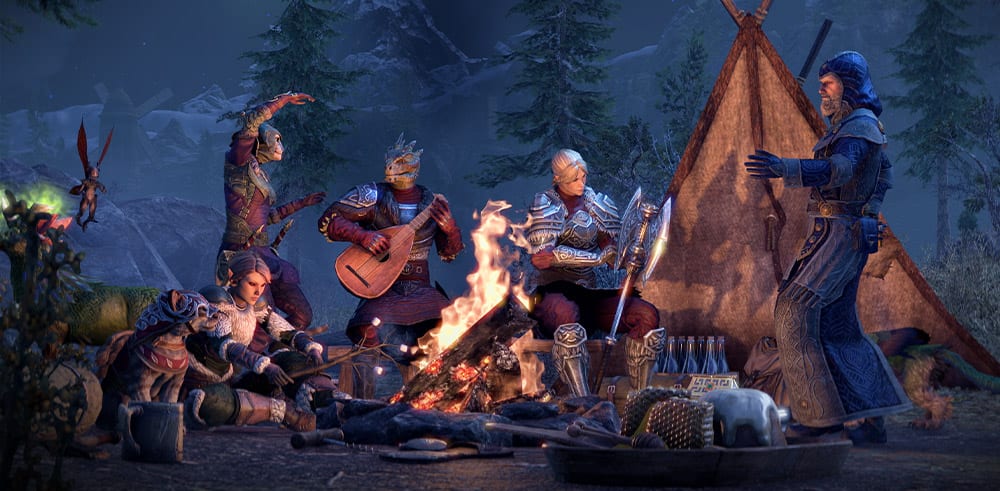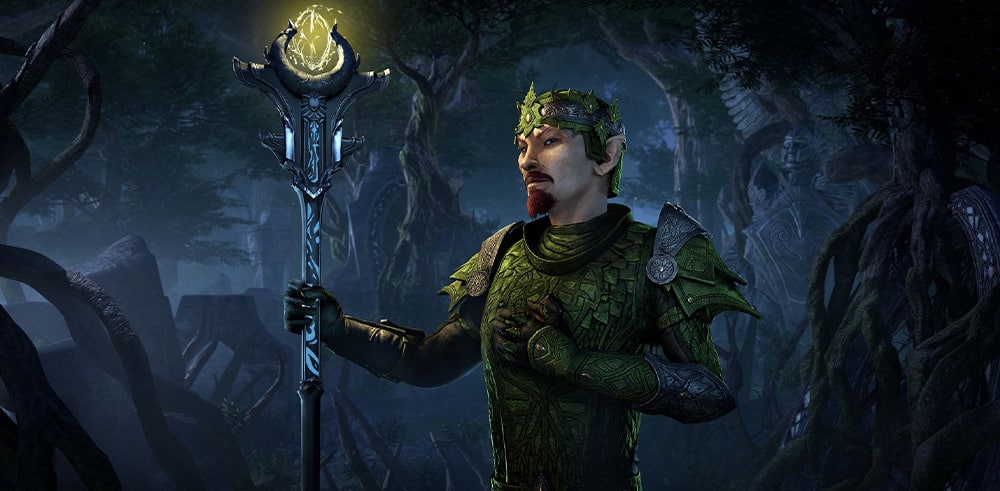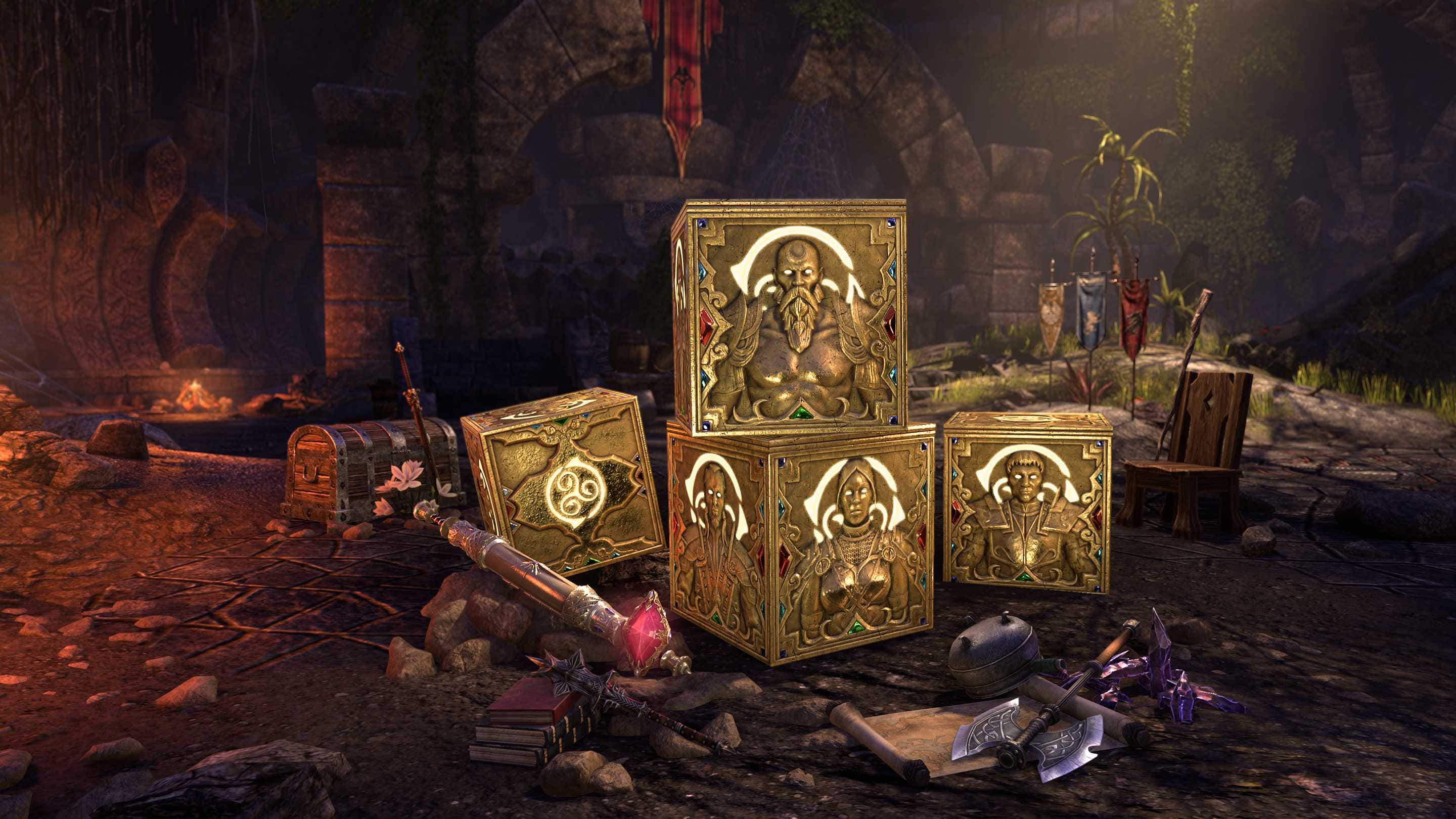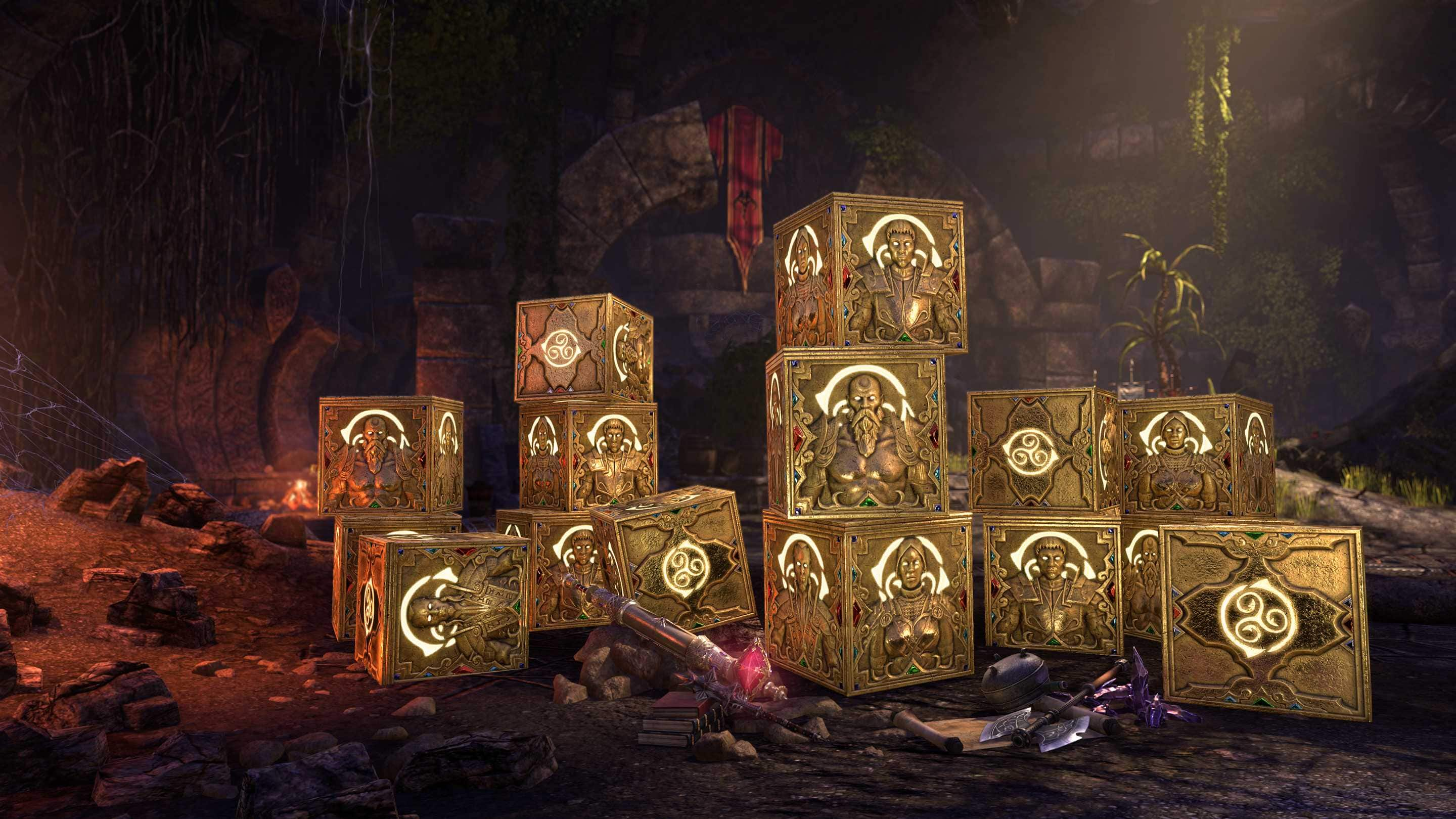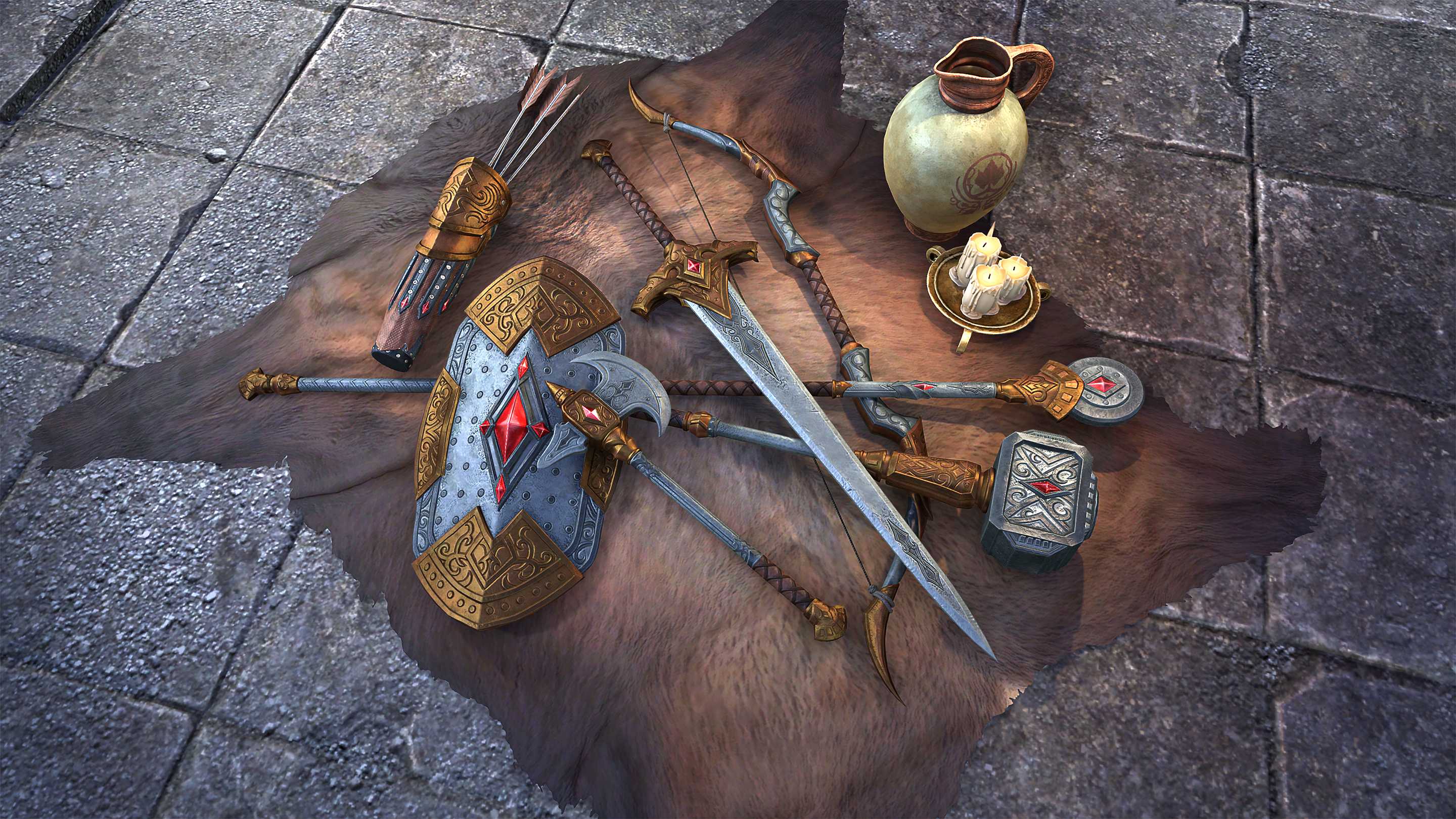
High King Emeric himself answers your questions and ponders the fall of the Second Empire.
Today’s trip to the archives reveals a brand new lore book written by His Majesty himself! Learn about Reman II and the decline of the Second Empire from a monarch who hopes to learn from the mistakes of the past and realize a new golden age for the Empire.
Our next article will feature a new lore book from Moon Bishop Hunal. Send your questions for the bishop about the Khajiit and their relation to the Moons to community@elderscrollsonline.com.
Reman II: The Limits of Ambition
By High King Emeric
Having found himself in command of the Empire after the deposition of the incompetent Kastav, Reman II's first notable endeavor was to negotiate a swift end to the Winterhold Rebellion of 2804. Reader, grant this thought due consideration—a new and largely untested leader was able to make peace with angered Nords without further unnecessary bloodshed. This was no mean achievement, and truly it demonstrated the quality of the man who would bring a golden age to the Second Empire.
How could a leader of such quality, one who not only calmed the rebellious Nords, but who subdued and united nearly all of Tamriel to usher in one of the most peaceful, productive intervals in recorded history, let the Empire come to ruin? I will divulge my ruminations on the matter, but not before recognizing the accomplishments of this remarkable man and the lessons to be learned from them.
Reman II was a master tactician, and studying records of the battles he fought shows not only his own acumen, but his respect for his troops—and those of the enemy. When he conquered new territory for the Empire, he established rule with a careful hand, avoiding too much disruption to local customs, traditions, and particularly to established trade. The Imperial culture spread, of course, but not through forced assimilation. Rather, the people came to accept and support the Empire by reaping the benefits of free trade, stability, and the development of better infrastructure. He gathered advisers from each province, and focused on his people more than many Emperors ever had.
For long years, peace prevailed across Tamriel. Necromancy and Daedra worship were abolished. Trade flourished, and, through the careful ministrations of Reman II and his councilors, the Second Empire thrived. And yet, the great emperor desired more. He turned his eyes to the provinces of Black Marsh and Morrowind, the unconquered territory weighing heavy on him. In the 2830s, he called forth the legions in an imprudent attempt to conquer Black Marsh. The losses to the swamp itself—its diseases and deadly beasts—nearly matched the number lost in combat with the Argonians, but the Empire managed to establish footholds in the northern and eastern marches by 2837. Reman declared Black Marsh to be officially annexed.
In perhaps his most critical folly, Reman II was not satisfied. He turned next to Morrowind and initiated the Four-Score War, a long, bloody conflict devastating to both sides. The battles were ugly, and the tenuous relations with Morrowind, which had shown some promise for diplomacy, were shattered. He perished fighting the Dunmer in 2843, and his heirs continued on as the Empire began to weaken, bled dry by the cost and wracked with dissent.
And that is, perhaps, the greatest lesson that Reman II can teach to any leader: to keep ambition in check. His success catapulted him to greater and greater visions for the Empire, but in his desire to unify all of Tamriel, he compromised the beliefs and practices that made the Second Empire's golden age great, engaging in a hopeless war unwanted by his people and unneeded to provide them with security, free trade, and a prosperous Empire.
High King Emeric answers your questions:
“Your Royal Highness, as leader of the Daggerfall Covenant, you know firsthand of the decline of the Second Empire. What are your thoughts on this Alliance War? What will it achieve? Your alliance has a noble cause, but it seems to me that good soldiers are fighting and killing each other while Molag Bal, our true enemy, succeeds.” – Alessandra of Cyrodiil
King Emeric says, “Though orators and demagogues will tell you otherwise, in politics matters are rarely as simple as just choosing one course over another, and a monarch must take thought for the future as well as the present. Though the Dark Anchors are falling across Tamriel, the epicenter of the invasion is the Imperial City of Cyrodiil. This is no coincidence: the city of Alessia and the Remans is itself a source of great power, both symbolic and actual. Who controls the Imperial City once the invasion is repulsed is a matter of profound consequence for all of Tamriel. We Bretons of High Rock remember the oppressive rule of Elvenkind, and are determined that Tamriel shall not be ruled again by such tyrants, whether from Alinor or Mournhold.”
“My King, I'm currently working on the rulers of the Second Empire, but the sources are obscure at best: the archives of Imperial College say that Sidri-Ashak is the ‘last strong Akaviri Potentate’ but also a ruler of Cyrodiil during the First Era. Who exactly is he? Did he rule after Versidue-Shaie and Savirien-Chorak, or sometime during the Reman Dynasty, or both?” – Iszara the Restless, Singer of the Scenarist Guild
King Emeric says, “Each Emperor of the Second Empire was advised by the leader of the Akaviri faction on the Elder Council, who bore the title Akaviri Potentate. Sidri-Ashak was Potentate to the little-known Emperor Brazollus Dor, who occupied the Ruby Throne between the reigns of Reman II and Reman III. Dor was not a particularly capable ruler, nor was he much interested in matters of state, preferring to spend most of his time at his country estate near Skingrad. The details of rule, and eventually nearly all issues of policy and politics, were delegated to his Potentate, Sidri-Ashak. This was Emperor Dor’s one wise decision during his reign, for Sidri-Ashak proved to be both a gifted administrator and a man of integrity. It is a shame that he is not better remembered today; I have a rare copy of his ‘Recollections of a Humble Potentate,’ and often enjoy dipping into it before bedtime.”
“Your Majesty, your great admiration for Reman Cyrodiil and his heirs is famous in these lands, but what's lesser known is your stance on his Akaviri successors. In your opinion, is there anything the Potentates did right, and are any of their policies worth reinstating in your future vision for a unified Tamriel under the Covenant banner?” – Legate Cyclenophus of the Bretonic Imperial Renewal Society
King Emeric says, “As mentioned above, the prudent monarch could do far worse than to model his polices upon those of Sidri-Ashak, who so capably served under Brazollus Dor, but I gather your question pertains to the regencies of Versidue-Shaie and Savirien-Chorak, who administered the Empire after the assassination of Reman III. Despite not being true Emperors, these latter-day Potentates ruled, for the most part, wisely and long. Versidue-Shaie was a peacemaker who ratified the Cervant Truce that ended the disastrous Four Score War with Morrowind, and suppressed the private armies of the Imperial nobility. But perhaps his greatest achievement was the Guild Act, which established and standardized regulation of trade and transactions across the Empire—and indeed, was adopted as de facto law across Tamriel, and even in the Summerset Isles. His successor, Savirien-Chorak, was not quite so able an administrator, and often responded poorly to the crises that began, in his era, to pull the Empire apart. But he was wise enough to recognize that it’s better to have the Orcs of Wrothgar as your friends than as enemies, and it was he who finally brought Orsinium into the Empire.”
“Your Majesty, I ask this question on behalf of the citizens of Belkarth and Dragonstar, loyal subjects of the once-great Second Empire, but apparently second-class to the Daggerfall Covenant. Craglorn in eastern Hammerfell is under severe threat from the so-called Scaled Court and these beings they call Celestials. Is Hammerfell not part of the Covenant? Why has there been no aid from Wayrest to combat the Celestial threat in these Covenant homelands?” – Enodoc Dumnonii, Savant of the United Explorers of Scholarly Pursuits
King Emeric says, “So far, only the parts of Hammerfell that owe fealty to the noble King Fahara’jad have joined the Daggerfall Covenant. Belkarth and Dragonstar are home to many brave and accomplished citizens with admirable aspirations, but until Northeast Hammerfell is represented by some kind of centralized authority, there is no one for the Covenant to sign a treaty with, and no one for the citizens of Craglorn to hold accountable for their protection. It is time for the people of Craglorn to band together and find a leader they can stand behind. The Daggerfall Covenant needs to use the east-west caravan road to supply our troops in Cyrodiil, so naturally we try to maintain order along that corridor, but we cannot commit to more than that under current circumstances. I’m sure a scholar such as yourself will understand.”
“Your Royal Highness (for that is your title), written history teaches us that Men cannot rule Cyrodiil. The First Empire collapsed after the War of Righteousness, and the defeat of those fanatics from the Alessian Order placed the Akaviri, foes of every race in Tamriel, on the throne. Aren’t both of these failures enough proof of the weakness of the human race and its inability to rule an empire that matches its arrogance?” – Bobcat
Chancellor Regina Troivois says, “That brings the audience with High King Emeric to an end for today. His Majesty apologizes for his abrupt departure; Scholars will kindly remain in place for a few moments while our intruding impostor is conducted by the Elite Lion Guard to another chamber for further … conversation. Thank you again for your fascinating questions, and if you write accounts of your audience with His Majesty, be sure to remark upon his warmth and easy approachability. That is all.”
